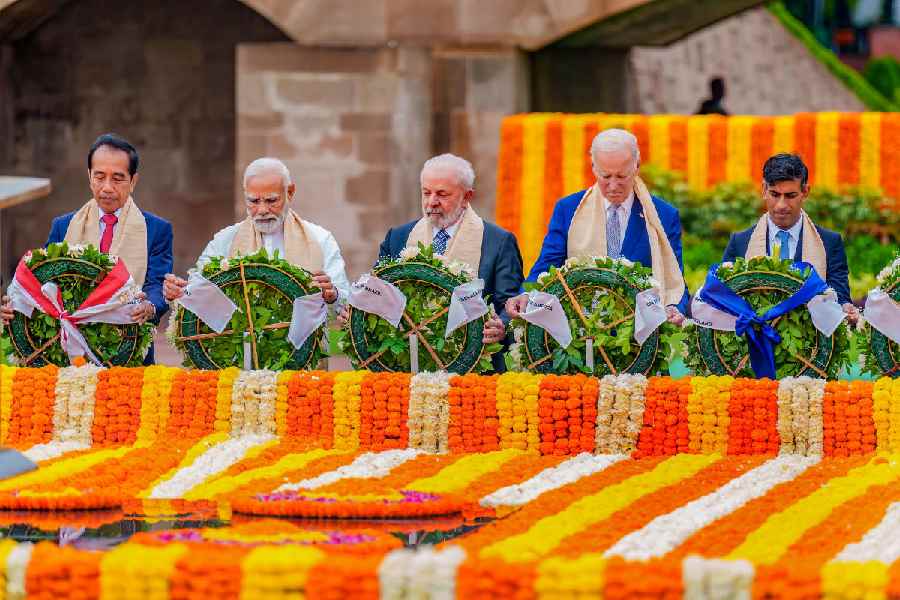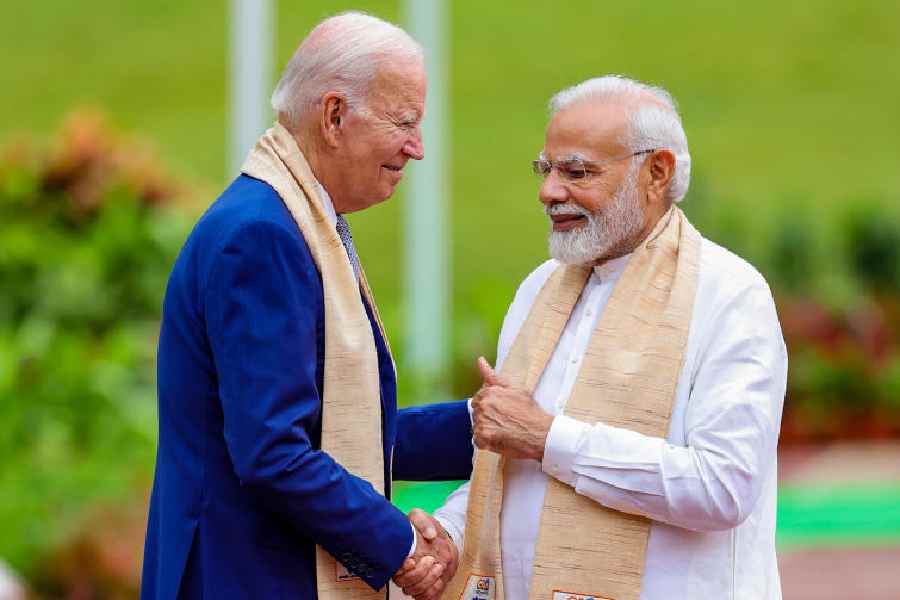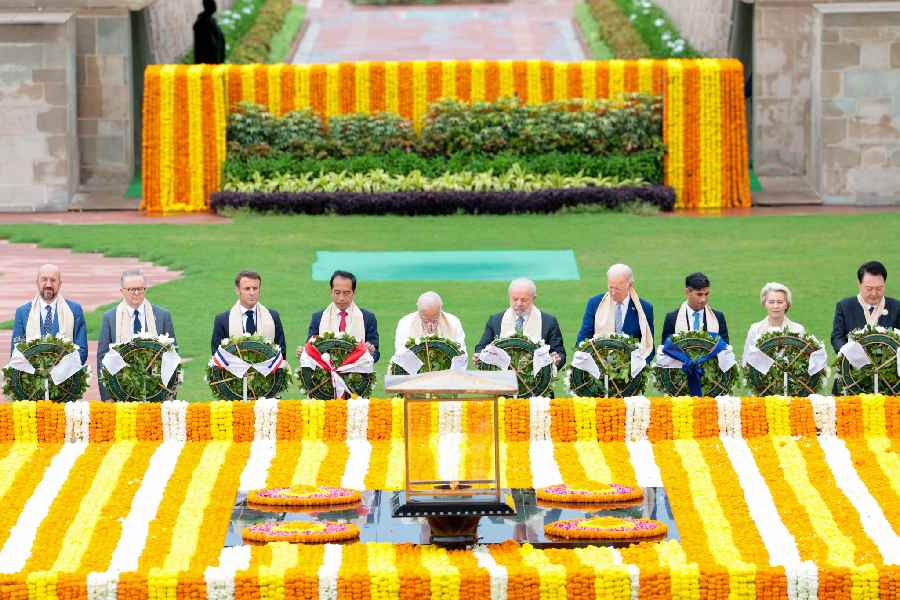Diplomatic observers had been placing bets and confidently predicting that there wouldn’t be a New Delhi Declaration to mark the G20 Summit. With the US, Russia and China sharply at odds with each other, it would be too tall a task, they insisted.
The doomsayers have turned out to be wrong. Indeed, the declaration was issued a day early. And the Russians appeared relieved that the Bali declaration language was toned down. One thing playing in New Delh’s favour was that the US was keen to give Modi and India a diplomatic victory and allowed the declaration language to be softened on the Russia-Ukraine war. Says one diplomatic observer: “US President Joe Biden has bent over backwards to ensure a success for Modi.”
And what about the Chinese? Could it be that President Xi Jinping may have goofed by not coming? The Chinese were less of a presence than they might have been if Xi had been here. And Xi himself lost the opportunity to gladhand with the leaders of the Global South like Brazil’s Inacio Lula da Silva. And Biden was able to dismissively remark about Xi’s absence: “It would be nice to have him here, but no, the summit is going well.”
Instead, India got the opportunity it was seeking to present itself as the leader of the Global South (in these politically correct times we don’t talk about the Third World any more). Says one diplomatic observer: “Biden doesn’t want to lose the Global South and thinks Modi can deliver it to the West.”
The most emphatic win in the battle for the leadership of the Global South, came when the African Union was declared as the G20’s newest member. Modi grabbed the photo-op moment in no uncertain fashion, when he bear-hugged the African Union Chairperson Azali Assoumani (who’s also the president of the Union of Comoros). Nobody’s yet raised the numerical issue of whether the G20 will now have to be renamed the G21.

Prime Minister Narendra Modi, US President Joe Biden, Brazil's President Luiz Inacio Lula da Silva, United Kingdom's Prime Minister Rishi Sunak and Indonesian President Joko Widodo pay homage at Mahatma Gandhi's memorial Rajghat on the final day of the G20 Summit, in New Delhi. PTI picture.
Mega rail and shipping project
Another huge success for India was the announcement of the mega rail and shipping project that will run all the way from India, via the UAE, Saudi Arabia, Jordan, Israel all the way to the European Union. Details about the project, which have been discussed for the last two years, were sketchy to almost non-existent. But it can still be marked up as the first scheme that might counter China’s Belt and Road Initiative and its infrastructure-building and transportation links to Europe and also across Asia. Biden described the project as a “game-changing investment” .
The fact is that the US is eager to draw India closer to it — and India is quite a long way down the road towards a partnership. So Biden spent time cultivating Modi and also took care not to steal the Indian prime minister’s thunder. Almost everyone played along with this, so Modi was able to lead several of the world’s top leaders as they walked barefoot to Rajghat to pay homage to Mahatma Gandhi. Yes, that made for a great photo-op that Modi will always be proud to display.

Prime Minister Narendra Modi with US President Joe Biden at Mahatma Gandhi's memorial Rajghat on the final day of the G20 Summit, in New Delhi. PTI picture.
Geopolitics is the primary game being played out across the globe right now. The US is eager to draw as many countries onto its side against Russia. Even more crucially, it wants to win friends in the Global South and outsmart the Chinese who are building scores of projects, both in Africa and Latin America. On the economic front, Biden is asking Congress for billions of dollars to boost the World Bank’s concessional lending. This is definitely good news for World Bank President Ajay Banga. If India can position itself correctly, it could be the key ally in the US outreach to the Global South – though the Chinese still have a huge lead in these regions.
Clause on religious harmony
Don’t think for a moment that India and Modi came out completely unscathed from the G20 summit. The US pointedly insisted that a clause on religious harmony be included which bluntly stated: “we strongly deplore all acts of religious hatred against persons… including against religious symbols and holy books.” Was this aimed, amongst others, at Modi and the current BJP government? The answer is almost certainly yes.
Also the US made very clear its displeasure on the handling of the press and the fact that the Indian government flatly refused to hold a press conference even after being pushed hard on the subject. It also announced that the press conference for the trip’s India leg would be held at the president’s next stop – Communist, non-democratic Vietnam.
Modi and the BJP government also came in for negative press coverage, perhaps unsurprisingly. The Times, London carried a scorching report from Nuh. Its correspondent reported that government bulldozers had razed a large number of mainly, Muslim-owned constructions after the riots there. Quite possibly, Modi’s dislike of the press and his refusal to hold a press conference, works against him. Almost everyone commented on the hundreds of Modi posters up all over Delhi.
International media critical
The international media also commented on the conference slogan: Vasudhaiva Kutumbakam, or One Earth, One Family, One Future, saying that Modi needed to practice it at home. And the New Yorker magazine wrote a sharply critical story, not on the G20 Summit but on Modi’s efforts to rebuild New Delhi to his own tastes.
Several publications and TV channels also commented on the green covers that have gone up all round Delhi to conceal slums and poorer parts of the city. “Its poor communities have been removed from sight and several slums razed," commented The Guardian.
Biden’s travel route is also significant and sends out a message. China has 14 land-based neighbours. Out of these, three have powerful armed forces – Russia, India and Vietnam. Russia has now emerged as China’s lesser partner, dependent on Chinese investment. India and Vietnam are two countries the US would like to enlist as allies.
Canada cold-shouldered
One leader who very clearly got the full blast of an Indian cold shoulder, was Canadian Prime Minister Justin Trudeau. India and Canada have always had friction points and this has become worse in recent months with incidents involving the country’s pro-Khalistan Sikh movement (While the movement is moribund in India, it’s alive and well in places like Canada, the UK and Australia). A government statement said Modi: “conveyed our strong concerns about continuing anti-India activities of extremist elements in Canada. They are promoting secessionism and inciting violence against Indian diplomats, damaging diplomatic premises, and threatening the Indian community in Canada and their places of worship.”
Surprisingly, the Canadians chose to end trade talks with India just weeks ago which was possibly not smart timing. Trudeau admitted he had held talks with Modi about differences between the two countries. He told reporters: “Canada will always defend freedom of expression. But he insisted, “We are always there to prevent violence, to push back against hatred.”
Modi re-election campaign?
Was the G20 meet the first move in Modi’s re-election campaign? The answer is almost certainly yes. It’s hard to tell whether it will have an impact or not. Suffice to say that the election is about seven months away. That is unless a snap general election is called earlier.
If anyone wants to read the G20 Delhi Declaration, be warned it’s a very comprehensive 37-page, 83-paragraph free-ranging document. How much of it will be acted on will emerge in the coming year.










